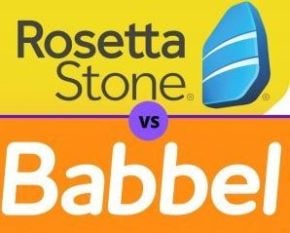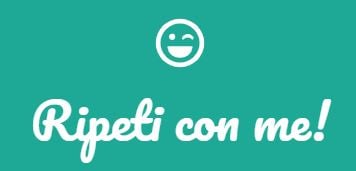Today, we’ll compare Babbel vs. Rosetta Stone.
These two language-learning apps are very popular in the language-learning world.
This is why we decided to give you an insight into both of them.
We’ll also recommend another Italian course: Ripeti con me.
Let’s get started!

Babbel review
Babbel is made for people who are learning Italian from level 0, meaning beginners.
It is designed to lead you through essential grammar rules and new vocabulary.
For instance, it will make you practice verb conjugations and learn Italian tenses.
Babbel explains grammar clearly and with lots of examples. It uses conversational language that you’re likely to use in real life, and there is a good variety of exercise types.
If you complete Babbel Italian, you can expect to be at or close to a B1 level of proficiency. This means it won’t make you fluent, but it will leave you with a functional level and the knowledge you need to structure your sentences.
However, if you have a high level of Italian, we don’t recommend it. This is simply because Babbel doesn’t offer advanced lessons.
Also, Babbel won’t help you much with your pronunciation.

Rosetta Stone review
As we said, Rosetta Stone, like Babbel, is one of the most popular Italian courses.
In general, the course is pretty fun and keeps you motivated. As you learn the vocabulary, you feel like you are making real progress. And this helps you develop a learning habit.
Rosetta Stone is aware of the fact that no one really likes grammar, so she won’t make you go through complex grammar rules. In general, she doesn’t explain much about the rules of Italian, but it’s based on the “acquisition” model.
This model basically refers to how children acquire the language, that is, in a rather natural way. For instance, it’ll give you pictures, and you have to select the right answer. This is why Rosetta Stone is so popular.
However, it’s not a perfect course because you can’t really learn that much with just pictures. You’ll learn the most popular expressions and some vocabulary, but it won’t help you get fluent.
In other words, it’s a good course if what you want is to improve your vocabulary, but if your aim is to become a fluent speaker, we don’t recommend it.

Babbel vs. Rosetta Stone: what are the differences?
First of all, both platforms have well-structured lessons that build on each other but can get a bit too repetitive.
Babbel teaches using longer dialogues, and Rosetta Stone uses more individual sentences.
Like with Rosetta Stone, the audio quality is high, and the layout and design are nice. However, voice recognition software can be frustrating for both. In fact, it is not too reliable.
Babbel, unlike Rosetta Stone, has a Review Manager feature to help you bring back information you’ve learned in previous lessons.
Babbel has pop-up culture and grammar tips in your native language that help you contextualize what you’re learning with useful and practical explanations as well as translations of the words and sentences you learn every step of the way.
Rosetta Stone’s immersion method offers no explanations or tips in your native language, meaning you’re doing 100% of your learning in your target language.
It’s useful for learning the basics, but as you progress through your lesson, it can be harder to understand complex grammar topics without extra explanations.
Trying to convey all the information from images alone can lead to unnecessary confusion when a simple explanation in English would work much better.
Babbel lessons tend to cover more material at a faster pace compared to Rosetta Stone.
On the other hand, Rosetta Stone takes time drilling you on the same words and phrases, meaning lessons move more slowly.
Also, this makes Rosetta Stone’s lessons a bit more monotonous and repetitive than Babbel’s lessons.

Babbel vs. Rosetta Stone: Difference in Terms of Price
If you want to fully use both Babbel and Rosetta, you have to purchase a subscription. However, both offer an introductory lesson or set of lessons as a free trial so users can try out the product before committing to a full subscription.
With Babbel, you can subscribe either with a one-month plan for $12.95, a three-month plan for $26.85, six months for $44.70, or a yearly subscription for $83.40.
So, Babbel subscription prices range between $7 and $13 a month, depending on the subscription length purchased.
Rosetta Stone is more expensive than most alternatives.
A subscription costs $35.97 for three months with access to one language, $179 for 12 months and access to all languages, or $199 for lifetime access to all Rosetta Stone language courses.
This means that depending on the subscription plan you choose and the discounts, Rosetta Stone can cost anywhere from about $12 per month of access to about $200 for a lifetime subscription.

Babbel vs. Rosetta Stone: conclusion
In conclusion, Babbel is a little cheaper than Rosetta Stone.
Babbel includes explanations and translations in English, whereas Rosetta Stone uses your target language almost exclusively.
They can both be a bit repetitive, and the audio recognition software is not very reliable.
Babbel lessons teach Italian at a faster pace compared to Rosetta Stone.
Both Babbel and Rosetta Stone are not going to get you speaking fluently as fast as some other platforms.
You’ll need to use other resources alongside them to get conversation practice.

Alternative: Ripeti Con Me
A great alternative if you really want to learn Italian is Ripeti Con Me.
Ripeti Con Me will make you think in Italian.
Basically, you will improve your Italian just by listening and repeating sentences, meaning your listening skills will get better as well as your pronunciation.
As you listen to the course, you will notice small changes in the sentences. You may not notice the changes at first, but you’ll soon realize that just by listening, your Italian is improving.
All it takes is 20 minutes every day, and you’ll start thinking in Italian in just a few days.
And the great thing is that you can start a 7-day free trial!
Why not give it a go?




















